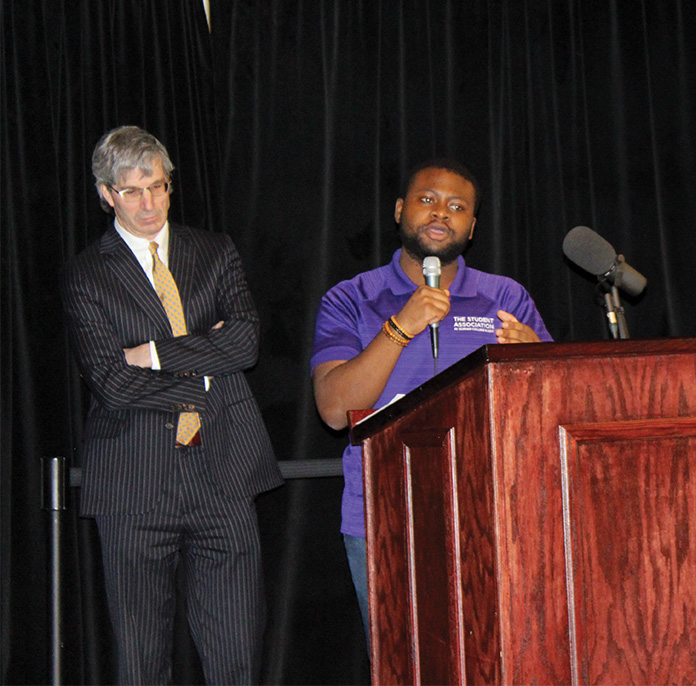Durham College hasn’t had its own Student Association (SA) for more than 14 years. That’s because when the University of Ontario Institute of Technology (UOIT) opened its doors, students at DC and UOIT began sharing the same SA. But that’s about to change soon.
After years of controversy involving accountability and student fees, the Student Association is in the midst of a split. Durham College and UOIT will now each have their own respective student governance instead of one serving both institutions.
Students at Durham College and UOIT will vote to elect their respective SA representatives over a period of two days, March 22-23.
Meri Kim Oliver, vice-president of student affairs at Durham College, hoped the SA wouldn’t come to a split.
“One of the things that Durham College students didn’t want to do was to see a split of the existing association,” she explains. “What we are very concerned about is that Durham College student built a student association for its students. We wanted to see a continuation of the SA to represent the current population.”
Oliver says political participation among Durham College students tends be lower than those at UOIT.
“Frequently the executives are more heavily weighted towards UOIT – and Durham College students, in terms of their board participation, have tended to withdraw,” she says.
“There was only one Durham College member on the board.”
The SA split appears to have caused much frustration within the student body.
“The Durham College institution keeps advocating on behalf on their students for a vibrant Student Association and arguing that there has been decline in the amount of participation from their institution,” says Sara Ventura, president of the DC and UOIT political science club. She thinks current executives are failing to create trust and actively engage students.
“The reason we don’t have a lot of board positions filled right now is because of current executives and this continued distrust and their inability to engage the student body,” she says.
Students at DC and UOIT who want to be involved in the decisions are finding it difficult to do so and events and meetings are announced on an inconsistent basis, Ventura says. Students were sent a mass e-mail about a Feb. 14 DC Town Hall meeting to outline the split in the SA only hours prior to the event, Ventura says.
“When the students don’t know what they’re voting on, when the agendas haven’t been posted seven business days in advance and when we know that the agenda’s being changed without students being consulted it leads to frustration,” Ventura says.
The Feb. 14 DC Town Hall meeting, held at the Gordon Willey building, didn’t go as planned. Students voted to end the 4 p.m. meeting early.
Ali Naqvi, a student in UOIT’s community development and policy studies program, says students voted to end the meeting prematurely because they felt the meeting wasn’t about student participation.
“My view on the meeting was that it was very disorganized and it wasn’t about having meaningful participation – it was creating control of messaging to an audience,” he says.
He is not convinced an SA split between DC and UOIT will benefit students in the long run.
“I think that it’s really problematic for us to separate as an SA because unions are based around people power. Without people power we have less power so two separate unions means less people and the institutions have more control over us,” Naqvi says.
The SA’s agenda and policies can be accessed online by students. On this day they were changed without prior student consent according to Naqvi.
“That’s incredibly problematic,” he says.
Vianney Nengue, interim SA president and vice-president of college affairs, was also at the meeting. He paints a different picture.
“Students are not opposed to having two different Student Associations, they’re opposed to how it happened,” Nengue says.
The interim president says some students feel their voices aren’t heard.
“They want to have more of a say in how this is happening and they want to have a voice in the process, that’s where the frustration comes from,” he says.
Nengue has seen students concerned over the SA split, but says many of them are supportive of the change.
“We have students from UOIT and DC who are concerned about what the future is going to look like, but overall there’s a lot of students that want us to create a new organization. In the next two months we’re going to figure how to make that more compliant,” he says.




